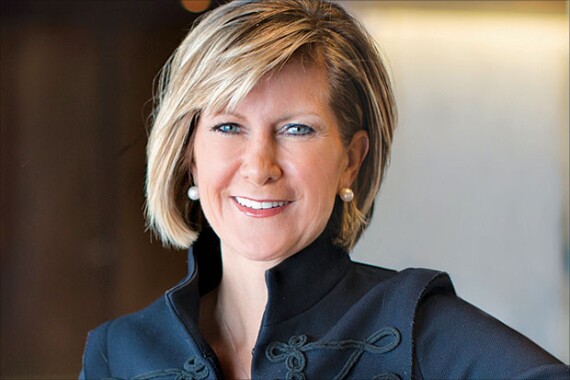
1. Mary Callahan Erdoes
Mary Callahan Erdoes is not as much of a household name as Warren Buffett or Jamie Dimon, but as J.P. Morgan Asset Management's chief executive, she has undeniable influence on Wall Street.
That was particularly evident earlier this year when Erdoes was among a who's who of leaders in business and finance including Berkshire Hathaway's Buffett, General Electric's Jeff Immelt, General Motors' Mary Barra, and Dimon, her boss to sign on to an open letter outlining a series of measures America's public companies could take to build prosperity.
Their recommendations included encouraging more diversity and independent thinking on boards of directors and, controversially, doing away with quarterly earnings guidance because of how it can get in the way of pursuing long-term goals.
"This all started with the heightened debate around short-termism, and short-termism really goes against the grain of what all Americans are looking for when they think about investing" for their retirement, Erdoes told Fox Business Network in July.
The group also is encouraging companies to appoint strong, independent directors who are not beholden to the CEO, Erdoes said.
Erdoes' influence stems from her success running the asset management unit of JPMorgan Chase. She has been its CEO for seven years, and in 2015 the unit reported its sixth consecutive year of record revenue, hitting $12.1 billion. Since the start of 2010, assets under management have increased an average of 6% a year, to $1.7 trillion at the end of 2015.
Reached by phone in Aspen, Colo. the latest stop on an August cross-country trek she and her family were making in their RV Erdoes reflected on another banner year that helped her retain the top ranking as the Most Powerful Woman in Finance yet again. The most important factor in the success of her business are the client relationships, she said, noting that about 260 clients have been working with the company for 75 years or more.
She also attributed her group's success to investments being made in talent and technology and to a "vigilant focus on investment performance." Last year, the staff completed more than 850,000 hours of training in a wide range of topics, including global financial markets and the economy, product innovation, cybersecurity and developments in regulation and compliance. On the tech side, her group's largest unit, global wealth management, is developing a digital strategy that will let clients engage with the company on demand, and via any method they choose.
Erdoes reports to Dimon and is widely rumored to be on the shortlist of his potential successors. She is one of three women on the company's operating committee and like the others Chief Financial Officer Marianne Lake and General Counsel Stacey Friedman she has made advancing the careers of women a top priority. A few years ago Erdoes and Lake established a program called Women on the Move. This program, which sends female executives to meet with their colleagues in other countries, is designed to both inspire and encourage women throughout the global bank to "take charge of their own careers," she said. Erdoes noted with pride that 37 of the top 100 positions at JPMorgan Chase are held by women.
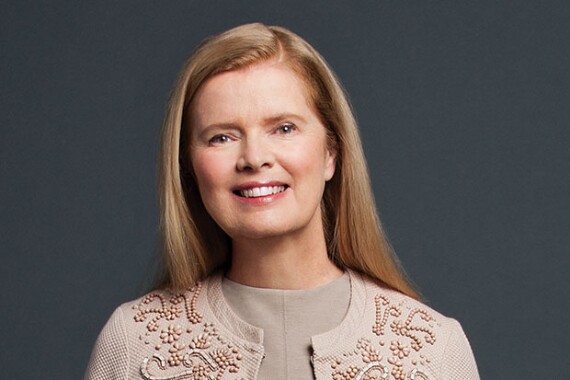
2. Barbara Byrne
After the U.K. vote in June to leave the European Union, Barbara Byrne had one message for her employees at Barclays: Pay close attention to how it plays out.
She advised them to step away from the frenzy and think about the future impact of Brexit on everything from capital markets to the U.S. presidential campaign.
"From where I sit, it's just another interesting moment," she said.
Byrne, whose four decades of industry experience has given her a sense of perspective, said she does not consider Brexit to be a crisis.
She said the "real crisis" in the world is the long stretch of sluggish economic growth that's helping fuel the rise of populist frustrations.
Byrne got her start in banking at Lehman Brothers in the 1980s. She worked there until its collapse during the financial crisis and subsequent acquisition by Barclays.
Now she has arrived at her own personal interesting moment and has started to think about the next steps in her career. One thing she knows is that she wants to continue to make a difference similar to the experience she had this year as a producer on the movie "Equity."
How that inclination will play out she isn't sure, but she has given some thought to the idea of possibly running for public office someday.
"I love having an impact in a pretty real way," she said.

3. Abigail Johnson
Abigail Johnson does not often speak publicly, but one of the topics she tends to bring up when she does is gender equality.
In an interview with the recruiting site Glassdoor in March, the president and chief executive of Fidelity Investments said that companies looking to develop more female leaders need to create training and mentoring programs specifically for women. She also encouraged women with ambition to seek out new opportunities, even those outside their comfort zone.
"As women, we need to remind ourselves to have an 'opt-in' attitude," said Johnson. "Career downturns happen to everyone and we must remember to treat them as opportunities to change how we work or try something new. That is what shows our true mettle."
Johnson has headed the Boston-based mutual fund giant, America's 20th-largest private company, since October 2014, when she replaced her father, Edward "Ned" Johnson 3rd. In her first full year on the job, Fidelity took in record revenue but reported lower profits as it spent more on technology and staffing. Revenue for 2015 climbed 6% to $15.9 billion, as operating income fell 6% to $3.2 billion. Companywide employment rose to 45,000 people, from 42,000 a year earlier, and overall expenses totaled $12.7 billion 10% more than in 2014. Total assets under management grew 1%, to just over $2 trillion.
The technology upgrades and other changes come as Fidelity tries to meet the needs of increasingly cost-conscious investors. "At Fidelity, we are in the business of doing nonstop innovation," Johnson told an economic outlook luncheon in Providence, R.I., in June. "We've had to work to do new things, and we've had to work to do everything we already do in new ways."
In a letter to shareholders, Johnson said customers sought more help than ever, and the company handled it without disruption "a testament to the investments we have made in systems and technology."
Another of Johnson's priorities is closing the wealth gap between men and women. Women are not only paid less than men, generally they also are less comfortable talking about money with a financial adviser than men are, according to Fidelity's research. To that end, the company has created an array of programs, seminars and online tools specifically for women to educate them about investing and saving for retirement.

4. Marie Chandoha
With more than three decades in the financial services industry, Marie Chandoha has been around long enough to see significant progress toward management diversity. That's why she was surprised to read about a Morningstar study last year that found only 9% of U.S. open-end fund managers were women a statistic that, she said, convinced her that she had to redouble her efforts to develop and advance women at her company.
Since joining Schwab in September 2010, Chandoha has made it one of her personal missions to foster an environment that promotes diversity. She established a Women's Leadership Program and is now working to develop mentoring and executive coaching programs within the company. Today, the two largest portfolio management teams measured by assets under management exchange-traded funds and money funds are led by women.
Chandoha's emphasis on cultural growth has been mirrored by asset growth; during her tenure, assets have grown $85 billion, to more than $284 billion. Last year Schwab posted the second-highest rate of growth among the top 10 providers of ETFs in the country. As of March, the company ranked as the nation's seventh-largest money fund manager and sixth-largest ETF provider.
"I believe that fostering an open, respectful work environment, and encouraging people to speak openly about what is working and not working has been a huge contributor to what has made us so successful," Chandoha said.
That philosophy, according to Brett Wander, the company's chief investment officer for fixed income, is directly attributable to Chandoha. Each year, Schwab conducts an engagement survey to assess employee satisfaction. Before Chandoha's arrival, the investment management division ranked last among the dozen divisions surveyed; last year, it ranked first. "Marie has inspired a culture that is the envy of the industry," Wander said.

5. Margaret Keane
It was one thing for Margaret Keane to lead the retail finance arm of GE Capital before it spun off from its parent company, General Electric.
But completing the separation from GE in November 2015 with a $20.4 billion exchange of stock, the largest in history was a wake-up call.
As the president and chief executive of the now independent Synchrony Financial, Keane feels an even greater responsibility to provide strategic vision and direction for its future. That has translated into new retail partnerships, multiyear extensions of its credit card programs for Amazon and PayPal, dramatic growth for its online banking operation and integrations with Samsung Pay and Apple Pay.
"One of the biggest realizations for me and my leadership team is that the buck stops here," Keane said. "We are the company, so no referring back to a larger entity of why we could or could not do something. It is up to us."
That knowledge has given Keane the freedom to treat Synchrony as "an 80-year-old startup" despite it now being a member of the S&P 500. While best known as the nation's largest provider of private-label credit cards, serving brands such as Gap and American Eagle, Synchrony experienced startup type of growth at its consumer bank last year. After it launched a new digital-banking portal that dynamically adapts to all mobile, tablet and desktop browsers, deposits swelled to $29.7 billion, a 50.8% increase from 2014.
Under Keane, who describes herself as "an early adopter and proponent of technology," Synchrony has continued to innovate in its core business as well. Along with plugging many of its cardholders into Samsung Pay and piloting Apple Pay for J.C. Penney customers, Synchrony has begun using data from its transaction processing network to anticipate customer desires and send them customized offers.
Synchrony had a good year overall, with net earnings increasing 5% from 2014, to $2.2 billion. Purchase volume on its credit products increased to $113.6 billion in 2015, up 10.1% from the year before.

6. Diane Offereins
Networks are a big deal for Diane Offereins in more ways than one. When she's not busy running a worldwide card payments network, Offereins is often advocating for women's networking.
At Discover, she started and served as executive sponsor for an employee resource group called Professional Women Impacting Results. She's also part of other women's organizations, such as The Committee of 200, Womenetics and The Chicago Network.
"It's important for women to help other women," Offereins said. "It is as easy as walking down the hall and introducing yourself or asking to meet over lunch or coffee to pick someone's brain. No matter where you are in your career, someone has been at a company or within an industry longer than you."
Her volunteer activities include serving on the board of Children's Home and Aid, which helps families overcome issues such as poverty, abuse and neglect. Her son is on the organization's junior board, an experience that she said has instilled in him a commitment to helping others.
Commitment is a key characteristic for Offereins herself. She has been in her job for more than a decade, is a member of the company's executive committee, and leads one of its two businesses that report results publicly. Last year she expanded card acceptance to 37 million merchant locations (a 20% increase) and to 1.9 million ATM locations (a 19% increase), and Discover processed $312 billion of volume on its networks, including $118 billion of Discover Card sales.

7. Charlotte McLaughlin
It's easy to expand in a booming economy. Adding expertise and developing products is tougher in an uncertain environment, though it can pay off big, particularly if competitors are retrenching.
Such is the operating philosophy of Charlotte McLaughlin. Since assuming her position in 2002, she has been building up what had been a dormant business, making capital markets a profitable and strategically important part of PNC Financial Services Group.
Late last year, her role was expanded to include the newly formed financial institutions group. Previously, the capital markets division had a business line dedicated to providing investment banking and liquidity management services to banks. The new group broadened that expertise to include insurance companies, asset managers, broker-dealers, and international financial institutions. McLaughlin consolidated teams and made critical enhancements to improve client coverage, provide career-development opportunities and, ultimately, deliver superior risk-adjusted returns for PNC.
Though still in its development stage, the new team already has proved to be an asset. PNC now offers securities underwriting and distribution for its broker-dealer clients, allowing them to raise debt financing as well as acquire newly issued securities.
The fixed-income group also added a municipal strategist, who is responsible for publishing regular muni bond market commentary, advising clients about the strengths and weaknesses of issuers and evaluating investment portfolios. This new area of coverage has been a boost for the team, and the strategist, Tom Kozlick, is a social media celebrity of sorts, with 2,500 Twitter followers. Satisfaction ratings have surged because clients feel more connected and informed.
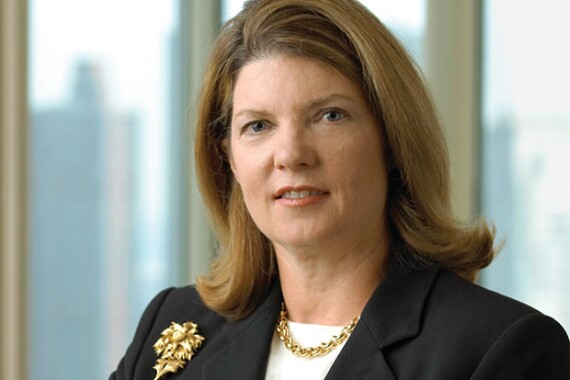
8. Candace Browning
Candace Browning has two very important roles at Bank of America Merrill Lynch both related to research.
Not only does she oversee research for the investment bank, she also spearheads some of its work to evaluate innovative fintech startups.
In the latter role, Browning and her team met with more than 100 firms last year to determine whether they might be worthy of investments. "The team receives many solicitations and selects with a disciplined approach," she said.
The focus is on companies that specialize in predictive analytics, voice transcription, and distributed ledger technology, among other fields. Browning and her team also established 25 pilot programs focused on new technology and launched a speaker series with entrepreneurs and industry experts to get insight into emerging trends.
She encourages employees to think creatively in their research topics, spurring, for example, a widely read report gauging Airbnb's impact on the hotel industry and a popular collection of statistics and maps called the Transforming World Atlas.
"As my team's leader, my role is to create a vision identify the hill we want to take and then motivate, inspire, empower and organize my teams to take that hill," Browning said.
Her efforts are paying off, with the bank being named Institutional Investor's top global research firm for an unprecedented five years running. The success is all the more notable coming despite tough economic conditions that spurred cuts in expenses and staffing.

9. Edith Cooper
For decades, Goldman Sachs has been a prestigious recruiter of financial talent. It annually dispatches hiring teams to more than 400 schools worldwide, with its feeder network including the Ivy League along with elite U.K. universities such as Cambridge and Oxford.
But even with more than 250,000 applicants for its summer program and analyst classes each year, Goldman questioned whether it was doing enough to foster diversity in the pool of hopefuls. That's why Edith Cooper, its global head of human capital management, is leading an effort to refine the way it finds talent.
This year Cooper and her team scrapped first-round, on-campus interviews with undergraduates to instead initially vet them with remote, off-site interviews using a new video conferencing technology platform. The idea is not to expedite the interview process, but to expand the search for candidates who might not be discovered on those campus trips. "We want to hire not just the economics or business undergraduate," Cooper said in a June briefing with reporters, "but there is that pure liberal arts or history major that could be the next Lloyd Blankfein."
The evolution in recruiting is just one of several foundational changes to hiring and promotions that Goldman undertook in the last two years. In May, Cooper told the Wall Street Journal that Goldman dropped the long-standing numerical ratings in performance reviews in favor of more regular employee-manager interactions. The investment bank also was the first on Wall Street to mandate protected weekend days for junior bankers and to ban interns from working past midnight. In recognition of these efforts, Vault recently named Goldman the best banking firm to work for in 2017.
Cooper, who joined Goldman 20 years ago, is a management committee member and vice chair of the partnership committee, which is tasked each year with choosing new partners from among those who are managing directors.
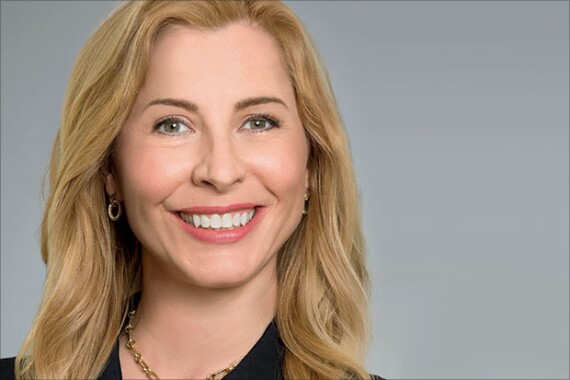
10. Rebecca Patterson
Rebecca Patterson might be a financial expert who journalists at CNBC and other news outlets seek out for commentary, but it wasn't so long ago that she was on the other side of the interview.
Patterson used to work for Dow Jones and the Associated Press, covering politics, economics and financial markets in the United States and Europe.
She said the skills she picked up as a journalist help her communicate effectively, including talking anxious clients through recent market blips and downturns. And that guidance has helped Bessemer Trust achieve a 99% retention rate, a point of pride for her.
The highest-ranking woman in the company's 108-year history, Patterson is part of the core executive team defining and driving corporate strategy.
As the chief investment officer, she takes a hands-on approach to research, leading a six-person team that meets daily to review markets and strategy.
"I love research," she said, explaining why she stays involved in it despite her myriad other responsibilities. "It's a group effort, of course, but at the end of the day, it's my neck and I want to own it."
Outside of her job, Patterson is a senior member of the Chess Fund, which promotes competitive chess playing in New York's public schools. She often organizes "chess parties" in her home for promising young students at P.S. 41, where her 8-year-old and 11-year-old daughters attend school. The girls and their schoolmates not only get in some chess matches at the parties, but also bake cookies.

11. Suni Harford
Citigroup wants women interested in a career on its sales and trading desk to know they can come from a variety of backgrounds.
In a recruitment video for its women in trading program a few years ago, Suni Harford made the case that the group has "a job for every single person and every single skill set." The video also included interviews with dozens of women in management and associate roles who came to Citi with backgrounds ranging from engineering to art history. Harford herself was a physics and math major at Denison University, a liberal arts college in Ohio.
This program, meant to help remove cultural barriers so more women would consider a career in securities, has been a breakthrough. Women made up 40% of its incoming 2016 analyst class, up from just 20% a few years prior.
The program expanded last year to include mentors for new hires (and even for female summer interns). Harford requires her direct reports to meet with the senior women in their departments for one-on-one career discussion at least twice a year.
Harford has been a champion of nurturing diverse talent at Citi since she became its head of markets in North America in 2008. For the past four years she has been co-chair of Citi Women, a global women's career-track initiative that involves more than 130,000 female employees. Another key to expanding options is to post more job openings so that employees could pursue available opportunities. In 2015, 96% of Citi jobs were posted, compared to only 40% in 2013.
Last year Harford used the women in trading program as a model to launch a network focused on other underrepresented groups at Citi. Her industry influence is equally impressive. Among other activities she was selected this year for the board of the Securities Industry and Financial Markets Association.
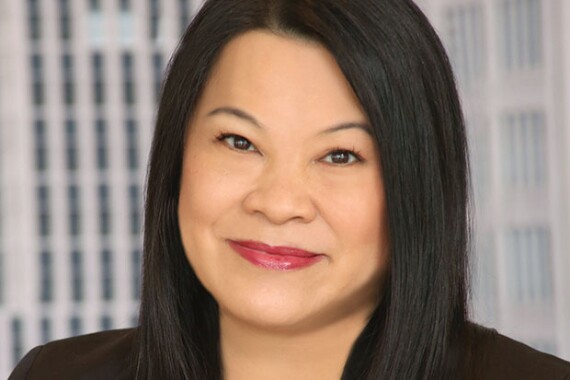
12. Joyce Chang
Though some other investment banks have scaled back equity research efforts in recent times, Joyce Chang has successfully led continued investment and expansion at J.P. Morgan.
The 950 research professionals she oversees at the investment banking unit of JPMorgan Chase cover more than 3,700 companies worldwide and provide economic forecasts for more than 60 countries. The team also produces 400 pieces of research each day for its 23,000 clients.
But Chang said the focus is on quality even more so than quantity, including research calls contrary to the market consensus. Two notable examples include a call that bonds would outperform equity markets and that the equity market would outperform developed markets, despite signs of deterioration that could suggest otherwise.
Last year Chang became co-chair of the Women's Network at J.P. Morgan's Corporate and Investment Bank. The program provides sponsorship, technical training, job opportunities and client events for more than 700 women. The goal is to retain, develop and promote senior female talent at the managing director and executive director level.
For 2016, Chang is helping spread those efforts outside the company and around the world. She formed an external advisory committee which includes representatives from Catalyst, 100 Women in Hedge Funds and Womensphere to help share best practices and explore new avenues to promote diversity globally.
Another one of Chang's projects outside of work over the past year has been helping immigrants gain access to financial services. In May, she received the Justice and Opportunity Award from the New York Immigration Coalition for her involvement in the annual National Immigrant Integration Conference, which brings together nonprofit organizations to empower immigrant and refugee entrepreneurs through financial inclusion.

13. Katia Bouazza
"You get what you get and you don't get upset."
That's a lesson many children are taught in the classroom, to maintain order and avoid hurt feelings. But when her 4-year-old daughter brought it home from school one day, it struck Katia Bouazza as controversial advice.
Though she said it's fair to advise against getting upset, she hopes children grow out of the other aspect of that lesson. In banking, especially as a woman, no one should settle for what they get if they feel deserving and capable of more, said Bouazza, who also has a 19-year-old daughter.
"In the face of disappointment, we don't necessarily settle or want to compromise," Bouazza said. "There is often a plan B or another solution that we can explore to reach our goal. This instinct has been critical to my success as a businesswoman."
The volume of debt and equity deals fell 50% in 2015 as a result of a market slowdown related to Brazil and to commodities, but Bouazza, who manages HSBC's global financing businesses for Latin America, is nevertheless increasing market share. Further, this year she led the bank through the largest emerging market bond offering to date, a $16.5 billion four-tranche transaction with Argentina across three, five, 10 and 30-year tenors. That was the first time Argentina has had access to the international capital market since its 2001 default.
Bouazza also has been actively engaged in helping women succeed at HSBC. Most recently she spearheaded the company's Senior Women's Initiative, which focuses on visibility, networking and career progression to help women thrive at a senior level.
"To help teach, mentor and sponsor women to realize their full potential and contribute to our business and society inspires me, and keeps me motivated for both my colleagues and for my two daughters," Bouazza said.

14. Julie Monaco
Early in Julie Monaco's career, the head of sales at Bankers Trust handed her a quote embedded on Lucite.
"The quality of a person's life is in direct proportion to their commitment to excellence, regardless of their chosen field of endeavor," it said.
The words, attributed to famed Green Bay Packers head coach Vince Lombardi, still resonate with Monaco.
At Citigroup, she manages a global network of senior bankers who provide financial services to such clients as central banks, finance ministries and state and local governments in 103 countries. What she hopes to coach them on is how each one plays a role in the overall success of the group with every interaction they have.
"That is the one of the most important responsibilities of a leader: motivating people and developing the future leaders of the organization," she said. "When you take the time to communicate these messages to your team you are creating a culture that is distinguished by a commitment to excellence."
This year one of the big successes was a landmark deal she helped engineer with New Zealand, in which Citi is helping the country restructure financial services across its government agencies.
Outside the bank, Monaco regularly attends the annual World Economic Forum in Davos. She's Citi's lead at annual meetings of the World Bank Group and International Monetary Fund.
She also is involved with several nonprofits, but is especially proud of her work with Junior Achievement USA, which tries to help young people make smart academic and economic choices. She was recently named the group's chairman.
Finding the time is a conscious choice she makes. "You get to a certain level in your career and your job where you feel like you have a lot to offer," Monaco said.

15. Diane Schumaker-Krieg
Sharing the stage with Michael J. Fox last November is one experience that helps remind Diane Schumaker-Krieg what it means to be courageous.
She was moved by the actor's courage and optimism long before they met. She had read his two books detailing his struggles with Parkinson's disease which she said are "among the most inspiring books on personal courage that I have ever read."
But serving as the moderator at the Wells Fargo Securities Middle Market Leadership Forum as Fox talked about his life was more poignant than she could have expected. "We looked ahead to the future, sharing Michael's bravery, optimism and wit with our audience," Schumaker-Krieg said. "While I have encountered many legendary leaders in my career, this interview with Michael, an extraordinary human being, stands out as the most moving, meaningful and fun."
Courage is key for Schumaker-Krieg. Her 31 years in financial services is practically a road map on how to embody it whether sticking up for the only other senior female executive in the room when a male colleague tried to take credit for her idea years ago at another job, or standing by a controversial call from one of her research analysts earlier this year.
The "underperform" rating on Valeant Pharmaceuticals by one of her then-recent hires, analyst David Maris, elicited plenty of scorn. For several weeks, Wells Fargo Securities was the only U.S. brokerage firm with that rating. "Both David and I endured withering criticism and disgruntled shareholders," Schumaker-Krieg said.
That is, until the company's stock tanked due to multiple issues, including missed earnings estimates, an accounting error and an SEC investigation.
"I have worked hard to create an environment where analytical independence is constantly reinforced, and to stand behind the analysts even when their work leads to unpopular or controversial conclusions," Schumaker-Krieg said.
As a reminder of the importance of courageous thinking, Schumaker-Krieg keeps a 2008 New York Times article on Warren Buffett close at hand. One quote in particular stands out to her: "Be fearful when others are greedy, and be greedy when others are fearful."
"Written during the financial crisis, it provided a welcome shot of optimism amid all the doom," she said. "Despite the homespun simplicity and obvious truth of the quote, human nature makes it exceptionally difficult to apply when needed the most. This is why there is only one Warren Buffett. I reread the piece periodically and distribute it to our team to encourage independent thinking and bold stock calls."

16. Kelly Coffey
On the wall in Kelly Coffey's office at JPMorgan Chase is a quote from Jeff Bezos: "We're not competitor obsessed, we're customer obsessed. We start with what the customer needs and we work backwards."
In modified form "we should obsess over our clients" the quote crops up in most of her quarterly town halls and leadership meetings. It embodies an ethos that Coffey tries to instill in her workforce. Managing someone's personal wealth, she reminds advisers, is a great privilege. And when it comes to people like those on the Forbes 400 list of the richest Americans more than half of whom are U.S. Private Bank clients the financial plans advisers put in place will likely have an impact far beyond the current generation.
Noticing that clients were placing more emphasis on planning for specific goals than on simple returns and performance benchmarks, Coffey oversaw the development of a new wealth management platform, launched earlier this year, to help them project future wealth, monitor and adjust their portfolios, and deploy surplus assets.
No two clients are alike, and Coffey, who sees her managerial role as that of a "player-coach," spends a lot of time figuring out how to provide tailored solutions to corporate executives, businesses owners and families with inherited wealth. "Kelly has led the charge in making sure our client conversations are advice-driven, not product-focused," said Phil Di Iorio, Coffey's boss and the CEO of the global wealth management division. Growing a wealth management business today also means reaching newly affluent clients in markets where wealth is accumulating rapidly, such as South Florida, and there, too, Coffey has "done a terrific job," Di Iorio said.
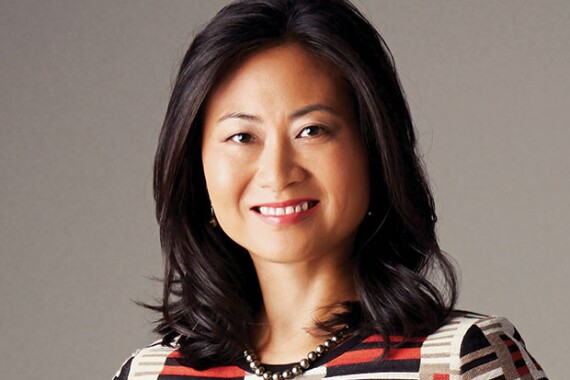
17. Elinor Hoover
On a recent weekend, Elinor Hoover was teaching her teenage son, an aspiring pianist, the importance of repetition.
"I was telling him to repeat this passage over and over and over again," said Hoover, who majored in music at Yale University. "Interestingly enough, he kept getting better at it."
To Hoover, his mastery wasn't merely practice making perfect. Instead, each try was a creative attempt to arrive at the best solution. Attacking a problem whether it's structuring an acquisition or merger for a Citigroup client or mastering the crescendo of a complicated piece is about approaching it with creativity. "It's what constantly allows you to be on the edge of your game," Hoover said. "The music process allows you to think about different angles."
Hoover is about a year into her role as global co-head of consumer products banking at Citi. She has been tasked with significantly growing the business, which is part of the corporate and investment banking group. It is a big opportunity because the sector is being transformed through megamergers and the popularity of emerging consumer brands.
As part of her job, Hoover reorganized the team to enhance tasks like client outreach. "I'm most proud of really restructuring the group, revamping it, and hiring new talent," she said. "We've hired a lot of young talent."
Outside of work, Hoover spends a lot of time fostering her son's interest in music. He has traveled to Portugal on a piano-playing tour and recently spent a couple of weeks at the Music Academy of the West, near Santa Barbara, Calif. Regardless of what he chooses to pursue professionally, studying music should serve him well, as it did her, Hoover said. "If you can understand elements of music and bring that into the workplace, you can communicate and express yourself" across language and cultural boundaries, she said.
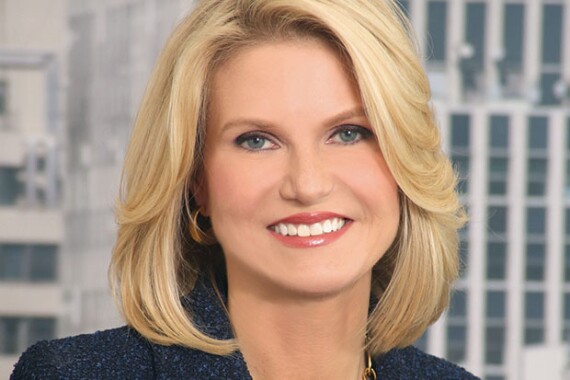
18. Elizabeth Myers
One of the hardest parts of managing nearly 200 people around the world is getting them to work together as if they are all in the same room.
Elizabeth "Liz" Myers has teams in New York, San Francisco, Tokyo, Hong Kong, Singapore, Sydney, and London. But no matter the region where they are, J.P. Morgan bankers have to be thinking globally, much as their clients are.
To help facilitate that process, Myers convened a two-day gathering of her managing directors last year so they could discuss clients' needs. The event is now in its third year and is expected to be annual.
The results of such face time are notable. "Each year there's at least one major cross-border transaction which is won subsequently as a result of in-person connectivity across regions," Myers said.
For example, a Chinese client, working with J.P. Morgan in Hong Kong, had a subsidiary in Austria. Although most companies like to go public where they are headquartered, in this case executives at the Chinese company felt investors might more receptive to the offering if it was done in Europe, because of so many similar companies being based there. At the senior global meeting, the Hong Kong bankers were able to discuss the opportunity with their European counterparts.
While things like teleconferencing has made worldwide communication easier, Myers says real face time still works better. "You can have all the technology in the world," Myers said. "But you're still confronted with time zones."
Earlier this year Myers also developed a private capital markets business that offers clients capital-raising alternatives such as pre-IPO financing, acquisition financing and private investments in public equity. The team, which is U.S. focused for now, completed four deals within the first four months since its formation.

19. Kathie Andrade
People who are used to doing something a certain way and succeeding often balk at being asked to do it differently. Without a deft touch from management, morale can suffer.
Such is the challenge of a large organization undergoing change. Kathie Andrade took on that challenge after TIAA promoted her to chief executive of its retail financial services business in January. In an effort to improve customer service, she set out to reorganize the 2,600-employee unit, integrating teams with their own unique cultures.
Each of the groups was making strides, but with little collaboration or shared strategy. So Andrade centralized the customer experience and digital functions in new divisions and set shared targets for growth across the business. Many employees were assigned to different supervisors and given new objectives.
To foster cohesiveness, Andrade took the time to bring her new leaders and their teams together to talk about their work and identify their challenges and goals.
Though uncomfortable, the changes are designed to make the business which provides financial advice, college savings, life insurance and banking services to TIAA's 5 million individual clients run more smoothly. It's easier to collaborate when teams work in the same location, for example, and customers appreciate having a single point of contact, especially one empowered to make decisions.
The experience prepared Andrade well for another big integration challenge ahead for TIAA the company announced in August that it had agreed to buy EverBank in Jacksonville, Fla., for $2.5 billion.
The acquisition would add $27 billion of bank assets, access to low-cost deposits, greater expertise in mortgages and a strong digital platform that should help Andrade's unit win over millennials.

20. Tracey Brophy Warson
For Tracey Brophy Warson, there's little difference between building relationships and building her business.
"Being the client's first call, being the trusted adviser that's what we want to be," said Warson, the head of Citi Private Bank in North America. "I think a lot of it comes down to listening, and listening with real care, indicating that you do care, and connecting with people."
Warson has nearly 30 years of practicing those skills in her work with ultra-high-net-worth individuals, families and institutions.
In 2014, she moved to New York City and took the reins of Citigroup's private banking activities in 25 offices throughout the United States and Canada. Warson's team helps manage the fortunes of people with more than $25 million in net worth and has $154 billion in assets under management overall.
Previously, Warson was western region market manager for the private bank, based on the West Coast. She admits that she misses San Francisco, and she frequently travels back there for business.
In 2010, she founded the Citi Women's Network in the Bay Area. A year later, she helped start the private bank's North America diversity operating committee.
Warson has strong advice for other women rising in their careers.
"When I started out, I was always really serious and I thought I had to be serious to be taken seriously," said Warson, the mother of two daughters in their 20s. "But the more I'm just my authentic self and allow my warmth and who I am to fully come through the more successful I am.
"I hope that more young women can think about that when they are developing in their own careers."

21. Paula Polito
You learn a lot about how Paula Polito got to where she is overseeing four businesses with $160 billion of assets by asking how she landed her first job.
Decades ago, Polito walked into WBZ-TV in Boston and asked the station to hire her for the news team. The editors turned her away, saying she was too inexperienced, but they failed to discourage her.
"I went back, and I went back, and I went back," Polito said.
Finally, she made a deal. "I said, 'If you hire me for free for two weeks, I will prove to you that I belong.' "
Polito had a job as an assistant assignment editor two weeks later and eventually worked her way up to managing editor.
She has continued to raise her hand for demanding assignments ever since.
Polito, who started her career in financial services 25 years ago, is a member of the executive team for UBS Wealth Management Americas and one of 124 managing directors in the global parent company.
Over the past year, she has led a push into algorithm-driven investment advice. In May, UBS signed an agreement with SigFig, a San Francisco startup, to offer robo-advisory services. Polito oversaw the review that ultimately led to the deal. She is now in charge of integrating the service into the call center where advisers will use SigFig technology to work with clients.
A defining moment in her career came in 2009, when she was recruited from Merrill Lynch to join UBS as chief marketing officer for wealth management in the Americas. The business was struggling at the time, coming off the heels of the financial crisis.
During her four years in the position, she was part of the leadership team that helped get the business out of the red. The unit lost nearly $900 million in 2009; in 2015, it posted a $754 million profit.
Polito said she has learned throughout her career that success comes when you are not afraid to step out of your comfort zone. After leaving WBZ, she took a job at a marketing agency. During that time, she pitched Fidelity Investments on a project. Fidelity passed on the proposal but offered her a job.
"You have to take every opportunity that comes your way," Polito said. "And sometimes the opportunity isn't there for you you have to create it."
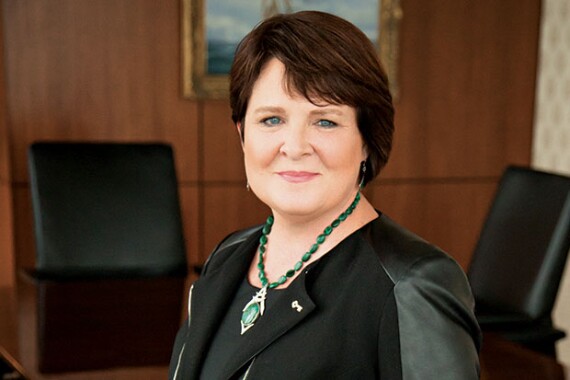
22. Amy Carlson
Amy Carlson had to make a tough call last year about a business she had spent the three previous years building: whether to scale it back, hold steady or keep investing.
Risk was growing in the high-yield corporate debt market, as defaults climbed, new issuances declined and prices fell for speculative-grade bonds and leveraged loans. Competition remained tough in the once-booming business of underwriting, sales and trading for this paper, and fixed costs were relatively high. Some argued in favor of pulling back. But Carlson made the strategic decision to further build out KeyBanc's capabilities. This included adding advice for issuers on how to structure debt offerings to achieve the desired credit rating. Investment in the business, she reasoned, would help overall growth and thus contribute to the bottom line for years to come.
The results bore out her decision. In 2015, KeyBanc was the bookrunner for 15 high-yield debt sales, a company record, and revenue from this business grew 80% from the previous year. A continued collaboration with the fixed-income sales and trading team resulted in 60% growth for revenue from high-grade and high-yield bonds combined. It also contributed to her team winning the lead manager role in a loan syndication of over $1 billion a milestone for an investment bank that caters to small and midsize companies.
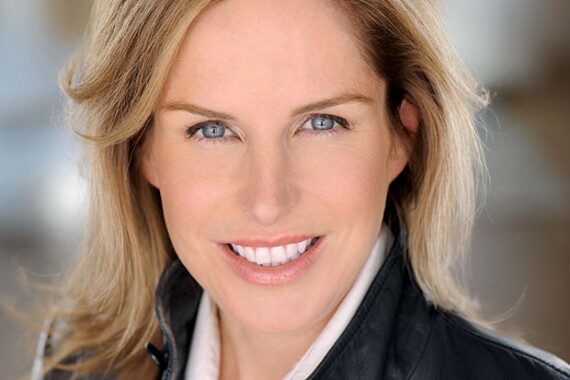
23. Dawn Fitzpatrick
Dawn Fitzpatrick understands the importance of bench strength. When asked to name a significant management decision in the past year, she cited hiring her successor after being promoted.
Previously Fitzpatrick was the global head and chief investment officer of UBS O'Connor, a $5.7 billion-asset hedge fund manager. She took on the additional responsibilities in January of overseeing $215 billion of equities and $90 billion of multi-asset investments.
She recruited Kevin Russell from Citigroup to take over her CIO role at O'Connor, and he in turn played a key role in strengthening the overall team by bringing on additional talent.
The focus on team building also shows in the culture of O'Connor, where Fitzpatrick started her career 24 years ago. Among the operation's more than 60 professionals, no single individual typically accounts for more than 10% of the returns generated by the flagship multistrategy funds in a given year. The best contributors tend to change from year to year. This makes the funds resilient, since they don't depend on a star manager or trader sticking around.
In an industry where people can be guarded about what they're up to even with colleagues, Fitzpatrick encourages collaboration. Every investment professional across the globe at O'Connor can see everyone else's positions in real time. In the post-crisis financial markets, having more eyes on risk is increasingly important, Fitzpatrick said. Under her leadership, O'Connor's funds have performed better in the seven years since the 2008 crisis than in the six years before it.
Fitzpatrick serves on UBS Asset Management's executive committee and on the global investment committee of its parent company. She also is one of 15 industry members of the New York Fed's investor advisory committee on financial markets.

24. Fiona Bassett
Fiona Bassett moved to New York with a mandate of making Deutsche Bank one of the top exchange-traded fund issuers in the United States.
Since her arrival in 2014, she's done just that. In her first year, Deutsche moved from 25th place to 15th, with $4.4 billion of assets under management. Last year, it introduced more than 20 new products and its assets grew to about $20 billion.
Though Deutsche is in the top five for exchange-traded products globally, it was a nascent player in the U.S. market when Bassett arrived. As of mid-2016, it ranked at No. 11, and she now aims to crack the top five.
Part of her challenge is that the U.S. ETF industry is dominated by two players: iShares and Vanguard, which control 80% of the market. They are so entrenched that the failure rate for new entrants is similar to the restaurant industry, Bassett said.
But Bassett, who is British, said she thinks her outsider perspective is helping set Deutsche apart stateside. "It gives us different insights into European and international issues," she said. "For example, we were the first U.S. provider to come out with products giving investors access to China and Asia, and also to offer currency-hedged products that give access to foreign markets with better risk-adjusted returns."
Since Deutsche needs to be scrappy in a competitive market, Bassett said she tries to hire people with a startup mentality. It is a team that likes to take on challenges not only at work, but for fun. This summer Bassett and eight co-workers completed a paddleboard relay race around Manhattan for charity. They finished the race in just over five and a half hours.

25. Claudine Gallagher
In 2012, BNP Paribas was the largest global custodian without a presence in North America and it wanted to change that. It found its leader in Claudine Gallagher, then the global head of depositary receipts at J.P. Morgan. She knew the custodial and clearing business and it helped that she is fluent in French.
Four years later, le succés.
In 2015, the U.S. arm of BNP Paribas Securities Services has reached $233 billion of assets under custody and it was at zero as late as 2010. This surge has helped BNP Paribas grow into the world's fifth-largest provider of custodial asset management and clearing services for hedge funds, asset managers, broker-dealers and other institutional clients.
When the North American business launched, the expansion was meant to better serve existing clients that were primarily in Europe, Asia and the Middle East. But under Gallagher, BNP Paribas has won the custody and settlement business of several major U.S. clients.
Last year was a pivotal one for the business Gallagher oversees, with the acquisition of Credit Suisse's U.S. hedge fund administration unit. Her group now spans across the Western Hemisphere with staff in South America.
But building a business is not purely about growing it; sometimes scaling back is just as crucial to continue thriving. In the past year, she chose to close two businesses and significantly reduce staff in one location. The decisions ultimately hinged on one question: Did these businesses have the proper controls and infrastructure in place to accommodate a changing regulatory environment?
"We can all be fabulous when we are growing and the market is great, but you need to be made of slightly sterner stuff to make hard decisions," Gallagher said.
Gallagher is a member of the securities services' global executive committee. She also is a founding member of the BNP Paribas North American Career Development Board and specializes in counseling director-level employees seeking future roles as managing directors.





